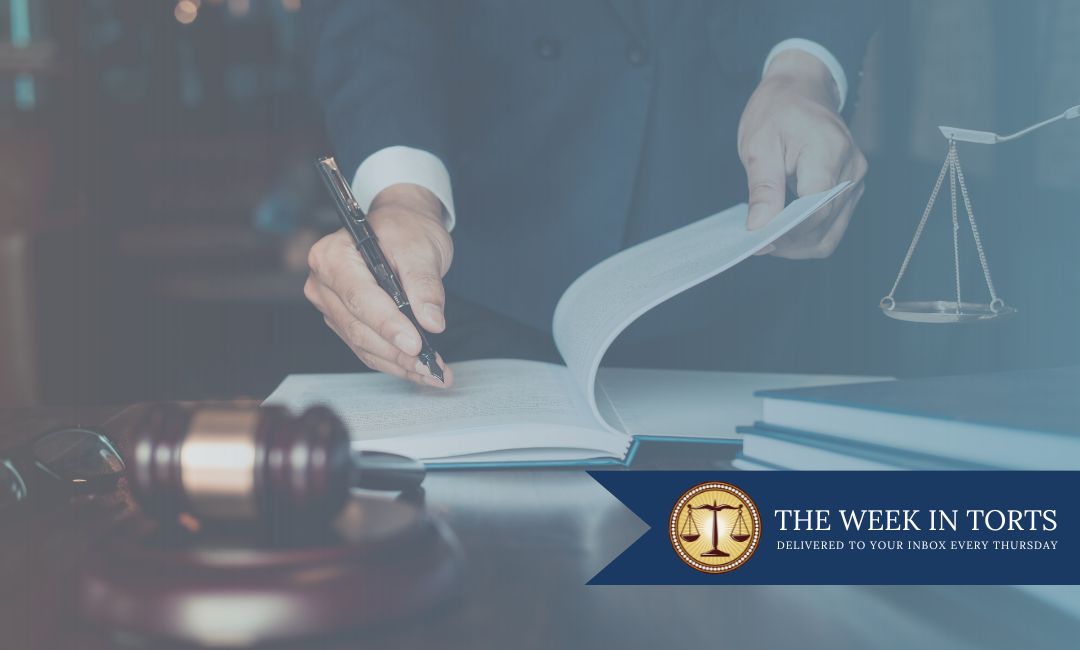The Week In Torts – Cases from May 26, 2023

More bad conduct rewarded on a technicality
FLORIDA LAW WEEKLY
VOLUME 48, NUMBER 21
CASES FROM THE WEEK OF MAY 26, 2023
ERROR TO GRANT LEAVE TO AMEND COMPLAINT TO ADD CLAIM FOR PUNITIVE DAMAGES ON A CLAIM FOR VICARIOUS LIABILITY – – NO EVIDENCE THAT DEFENDANT OR ITS OFFICERS, DIRECTORS OR MANAGERS KNOWINGLY PARTICIPATED IN, OR CONDONED, RATIFIED OR CONSENTED TO THE EMPLOYEES CONDUCT, OR ENGAGED IN CONDUCT CONSTITUTING GROSS NEGLIGENCE.
HRB Tax Group v. Florida Investigation Bureau, Inc., 48 Fla. Law Weekly D1011 (Fla. 4th DCA May 17, 2023):
The underlying complaint arose from an allegedly fraudulent financial investment the plaintiff made through a third party at the urging of one of the defendant’s employees. The plaintiff’s original complaint alleged claims of fraud and negligence against the defendant’s employee, a claim of civil conspiracy against the employee and the third party, and then claims of vicarious liability and negligent supervision against the defendant.
After the original complaint was filed, the plaintiffs learned that the defendant’s employee had referred the plaintiff’s president to the third party as part of a reciprocal referral program implemented by the employee’s managers. The plaintiff also learned that the employee had been terminated for her actions.
The plaintiff moved for leave to amend the complaint to add a new claim against the defendant for negligence based on its creation and handling of said reciprocal referral program, and also to assert a claim for punitive damages on its existing claim against the defendant for its vicariously liability. Aside from including a request for punitive damages, the plaintiff did not propose any amendments to its existing vicarious liability claim.
The trial court granted the motion for leave to amend. The appellate court reversed. It found that the trial judge improperly considered allegations and evidence that weren’t relevant to the claim for punitive damages being sought based on vicarious liability.
Instead, before concluding the plaintiff proffered sufficient evidence to establish a reasonable basis for recovery, the trial court relied on evidence of the direct negligence claim, which the court found was improper because a trial court has no authority to grant relief not requested in the pleadings.
As to the vicarious liability claim, the proffered evidence failed to demonstrate that the defendant and/or its officers, directors or managers knowingly participated in or condoned or ratified the employee’s conduct. Nor did the evidence show that the defendant itself had engaged in conduct constituting gross negligence. Thus, there was no a basis for punitive damages against the defendant based on the plaintiff’s theory of vicarious liability, necessitating reversal.
TRIAL COURT DID NOT ERR IN REFUSING TO SET OFF THE DIFFERENCE BETWEEN MEDICAL BILLS FOR THE PLAINTIFF’S SURGERY AND THE AMOUNT THE MEDICAL PROVIDER RECEIVED FROM THE INSURANCE COMPANY– THERE CAN BE NO SET OFF WHEN A RIGHT OF SUBROGATION EXISTS.
Yellow Cab of Jacksonville v. Lutchman, 48 Fla. Law Weekly D1026 (Fla. 5th DCA May 19, 2023):
The jury awarded the injured plaintiff who had been struck by a vehicle $375,000.00 ($275,000.00 for past medical expenses and $100,000.00 for non-economic damages). The trial judge entered a final judgment after set offs for $289,001.47. The defendants claimed that the trial judge erroneously refused to set off the difference between the surgeon’s bills for the disc replacement surgery and the amount the surgeon received from the insurance company.
The court found that the argument was entirely without merit (for reasons set forth in the trial court’s order not detailed in the opinion).
On cross appeal, the plaintiff argued that the trial judge erroneously set off amounts from the jury verdict for which a right of subrogation existed. Under §768.76 and BlueCross & BlueShield v. Matthews, the court noted that Florida has long recognized the subrogation rights of an insurer to recover payments made to an insured to for injuries which were caused by the tortfeasor, rendering a set off for those payments as improper.
COURT REVERSES TRIAL JUDGE’S GRANT OF A NEW TRIAL BASED ON THE CUMULATIVE EFFECT OF ALLEGEDLY IMPROPER STATEMENTS BY DEFENSE COUNSEL – – IMPACT NOT SO PREJUDICIAL AS TO VITIATE THE ENTIRE TRIAL AND WARRANT A NEW ONE.
Lazaroff v. Meek, 48 Fla. Law Weekly D1037 (Fla. 5th DCA May 19, 2023):
The trial judge granted the plaintiff a new trial based on what the judge believed was the cumulative effect of allegedly improper statements made by defense counsel during the proceedings. The trial court described one category of statements as age related (making the plaintiff’s age a theme of the trial) and supposedly suggesting Medicare would cover medical expenses, and the other category suggesting that the plaintiff was concealing evidence.
The court observed that the plaintiff’s age was relevant to issues of life expectancy and work life, and that many of the statements at issue were either incomplete or interrupted before they could possibly do any significant harm, and further noted that the trial judge had given strong curative instructions to minimize the potential impact. Also, some of the statements were made without objection from the plaintiff thereby as the court noted, reflecting a potential lack of prejudice.
Also, some of the statements were cut off unilaterally by the trial judge before an objection could be made, despite the existence of a permissible basis for the defendant’s inquiry.
The court also explained that the trial judge had adopted the plaintiff’s proposed order verbatim, which had noted that two statements, one in opening and one in closing, attempted to imply that the plaintiff had concealed evidence.
The court concluded that the opening statement was unobjected to and the closing statement was incomplete and subject to a strong curative instruction, so contrary to the trial judge’s findings in the order, they could not have been so inflammatory and prejudicial as to warrant a new trial. Because the reasons for granting the new trial were not supported by the record, the court reversed.
